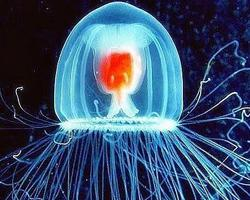
Greutăți și măsuri
| Lungime | 4 mm |
|---|
Descrierea animalului
The Turritopsis nutricula, commonly referred to as the "immortal jellyfish," is a small species of jellyfish known for its extraordinary biological process called transdifferentiation, which allows it to revert back to its polyp stage after reaching maturity. This unique capability essentially grants it a form of biological immortality, as it can theoretically repeat this lifecycle indefinitely under the right environmental conditions. The Turritopsis nutricula is a subject of fascination among scientists and laypeople alike due to its implications for understanding aging and cellular regeneration.Native to the Caribbean but found in oceans around the world due to ballast water discharge from ships, the Turritopsis nutricula is typically about 4.5 mm in diameter when fully grown. It possesses a bright, transparent bell through which its internal canal system can be observed. Radiating from the center of the bell are its tentacles, which it uses for locomotion and to capture prey. These tentacles are equipped with nematocysts, specialized cells that release toxins to stun or kill prey, typically plankton or small fish.
The life cycle of the Turritopsis nutricula begins as a free-swimming planula, which eventually settles onto the seafloor and develops into a colony of polyps. These polyps then bud off into free-swimming medusae, which are the adult forms of the jellyfish. What sets the Turritopsis nutricula apart from other jellyfish species is its ability to revert its cells to a more primitive state. When faced with adverse conditions, such as physical damage or scarcity of food, it can transform its cells from the medusa stage back to the polyp stage, a process known as transdifferentiation. This remarkable process involves the reprogramming of its cells, which can differentiate into new types of cells, allowing the jellyfish to essentially start its life cycle over again.
This ability has intrigued the scientific community, as it challenges the traditional understanding of cellular aging and death. Researchers are studying the Turritopsis nutricula in hopes of uncovering insights into human aging and diseases, as well as the potential for regenerative medicine. The mechanisms behind transdifferentiation could potentially be applied to human medicine, offering new avenues for treating injuries, degenerative diseases, and perhaps even extending human lifespan.
However, the spread of the Turritopsis nutricula across the globe also raises concerns about its impact on local ecosystems. As a potentially invasive species, it could disrupt local marine populations and outcompete native jellyfish species, altering the balance of marine ecosystems.
In summary, the Turritopsis nutricula, or the immortal jellyfish, is a remarkable creature that has captured the imagination of many due to its unique ability to cheat death through transdifferentiation. Its study not only provides fascinating insights into the natural world but also holds promise for groundbreaking advances in science and medicine.
Fotografii noi cu animale
Top 10 animale
- Dolphin gull (Leucophaeus scoresbii)
- Diana monkey (Cercopithecus diana)
- Moustached guenon (Cercopithecus cephus)
- Galápagos tortoise (Geochelone nigra complex)
- Japanese macaque (Macaca fuscata)
- Stone loach (Barbatula barbatula)
- Greek tortoise (Testudo graeca)
- Russian tortoise (Testudo horsfieldii)
- Common flying dragon (Draco volans)
- Galápagos penguin (Spheniscus mendiculus)